- Home
- Jean Stone
A Vineyard Summer
A Vineyard Summer Read online
PRAISE FOR JEAN STONE’S PREVIOUS NOVELS
“Stone is a talented novelist whose elegant prose brings the Martha’s Vineyard setting vividly to life.... A very good read.”
—Milwaukee Journal Sentinel
“Stone’s graceful prose, vivid imagery, and compassionately drawn characters make this one a standout.”
—Publishers Weekly
“Jean Stone is a truly gifted writer. I wish I could claim her as a long-lost sister—but I can’t. I can merely enjoy her wonderful talent.”
—Nationally best-selling author Katherine Stone
“A wrenching and emotionally complex story. Sometimes, if you are very lucky, you can build a bridge across all obstacles. A very touching read.”
—RT Book Reviews
“A very smart and well-written book.”—Fresh Fiction
“Stone herself lives on the Island, and we can feel her love for it throughout.”
—MV Times
Books by Jean Stone
A Vineyard Summer
A Vineyard Christmas
Vineyard Magic
Four Steps to the Altar
Three Times a Charm
Twice Upon a Wedding
Once Upon a Bride
Beach Roses
Trust Fund Babies
Off Season
The Summer House
Tides of the Heart
Birthday Girls
Places by the Sea
Ivy Secrets
First Loves
Sins of Innocence
Books as Abby Drake
Good Little Wives
Perfect Little Ladies
The Secrets Sisters Keep
A VINEYARD SUMMER
JEAN STONE
KENSINGTON BOOKS
www.kensingtonbooks.com
All copyrighted material within is Attributor Protected.
Table of Contents
Praise
Also by
Title Page
Copyright Page
Dedication
Acknowledgments
Chapter 1
Chapter 2
Chapter 3
Chapter 4
Chapter 5
Chapter 6
Chapter 7
Chapter 8
Chapter 9
Chapter 10
Chapter 11
Chapter 12
Chapter 13
Chapter 14
Chapter 15
Chapter 16
Chapter 17
Chapter 18
Chapter 19
Chapter 20
Chapter 21
Chapter 22
Chapter 23
Chapter 24
Chapter 25
Chapter 26
Chapter 27
Chapter 28
Chapter 29
Chapter 30
Chapter 31
Teaser chapter
To the extent that the image or images on the cover of this book depict a person or persons, such person or persons are merely models, and are not intended to portray any character or characters featured in the book.
This book is a work of fiction. Names, characters, and incidents either are products of the author’s imagination or are used fictitiously. Any resemblance to actual persons living or dead, or events, is entirely coincidental.
KENSINGTON BOOKS are published by
Kensington Publishing Corp.
119 West 40th Street
New York, NY 10018
Copyright © 2019 by Jean Stone
All rights reserved. No part of this book may be reproduced in any form or by any means without the prior written consent of the Publisher, excepting brief quotes used in reviews.
Kensington and the K logo Reg. U.S. Pat. & TM Off.
ISBN: 978-1-4967-1664-4
Kensington Electronic Edition: July 2019
ISBN-13: 978-1-4967-1664-4
ISBN-10: 1-4967-1664-7
For Kathy
Acknowledgments
With my ongoing thanks to my friends at the esteemed Edgartown Library Book Group for putting up with me: Annie (no relation to my main character!), Carol, Cathy, Debbie, Dot (with special thanks to Dot for introducing me to the Indian Burial Ground on Chappaquiddick and to the Chappy “family”), Ellen, Jane, Joyce, Judy, Marcia, Pat, Peg, Sharon, Sue, Sydney, and especially to our fearless leader, Lisa Sherman, who also happens to be the tireless, dynamic Edgartown Library Director. (If I’ve omitted anyone, please forgive me!) Thanks, too, to the wonderful author Susan Wilson for our delightful lunchtime writers’ group.
Also, thanks to Detective Michael Snowden at the Edgartown Police Department for his knowledge and research that pointed me in the right law-enforcement direction for this book.
And to so many of my neighbors whose names I’ve yet to learn, thanks for being here, and for keeping the island filled with peace and love.
Chapter 1
“You have to leave.”
Annie Sutton stood in the doorway of the cottage on Chappaquiddick. Her jaw went slack; her thoughts tumbled into one another.
Her landlord, Roger Flanagan, pressed his thin lips together as if attempting an apologetic smile. “I’m sorry, Annie. You’ve been a wonderful tenant. But my grandson, Jonas, is moving to the Vineyard.” He averted his eyes and stared off toward a cluster of scrub oaks in the side yard. “He recently completed the master’s program at the Art Institute of Chicago; he’s an exceptional artist—his medium is acrylics—so it makes sense for him to live here, what with the growth in tourism and an uptick in disposable income among the seasonal residents who are also discerning collectors. . . .”
Blah, blah, blah.
She barely heard a word he said after his opening line. It was already July first—the day that the entire island of Martha’s Vineyard launched into high season, which meant it would be nearly impossible for Annie to find a year-round rental. She’d heard that the feat was tough enough off season even on Chappy, which depended on a tiny ferry to connect with civilization or at least with the Vineyard—the stores, the gas stations, the medical facilities. Chappy was the nickname for Chappaquiddick Island, which technically wasn’t an island at all except on the occasion when the surf broke through a narrow strip of land on the South side. Chappy also was technically (and legally) part of Edgartown, the easternmost town of the six that were scattered around the Vineyard. Annie had learned that, when it came to geography and a few other things, the Vineyard sometimes made up its own rules.
Drawing in a slow breath, she asked, “When do I have to go?” Her voice quaked. If he’d already mentioned a move-out date, her brain hadn’t processed it yet.
Roger’s smile morphed into a sheepish look. For a seventy-plus-year-old man that Forbes magazine had proclaimed a hedgefund piranha, he looked oddly embarrassed. “As you know, your lease was a winter rental. It expired June first. After that, we’d agreed you’d be here month to month, with a thirty-day notice required by either party. So shall we say mid-August? That will give you a couple of extra weeks to find something else. Jonas can live in the main house until then.”
A couple of weeks of “extra time” would hardly make a difference. As much as Annie wanted to say, “No! This is my home!” Roger Flanagan was right: She had no choice. She’d known from the beginning that renting the cottage might not be long-term. She had not, however, chosen to believe it.
“Thank you,” she said, without meaning it. “The extra time will help.” Before she could add something polite about wishing Jonas success, Roger folded his arms.
“Big wedding here on the Fourth. Hope we won’t disturb you.”
She leaned against the doorjamb. With the Flanagans in New York most of the y
ear, she’d lived alone on the property for such a long time—nearly ten months and counting—that she’d almost forgotten the place wasn’t hers. “Weddings are nice.”
“It’s for our daughter, Dana. She’s all we have. Dana and, of course, Jonas.”
Of course, Annie’s mind echoed with a twinge of disdain. Then she realized that Roger’s remark must mean that Jonas was Dana’s son. Annie had seen the woman flit by the cottage once or twice, but was surprised she was old enough to have a child out of college. The master’s program at the Art Institute of Chicago, she corrected herself. “Well, don’t worry about disturbing me. I grew up in Boston. I’m accustomed to living with noise.” Besides, she expected that any sign of protest would be pointless.
He tipped his Tilley hat and shuffled away in his Tevas.
Closing the door, she slumped against it and said, “Damn.” She loved the little cottage. She loved Chappy, where she’d landed when she’d traded city life for the peaceful island. She’d made friends, connections with people she now cared about and who cared about her. She did not want to be forced to leave.
“Damn,” she said again.
At age fifty-one (a fact she found startling), Annie had lived long enough to know not to envy anyone who had a life of privilege. As a writer, she knew that every individual, every family, had a story (often a dark one, an underbelly, her old college pal and best friend, Murphy, used to call it), and that having beaucoup bucks (Murphy again) was no guarantee of happiness.
“But money helps when you need a place to live,” she said out loud now. Then she did what she did best in times of stress: She put on the kettle for tea.
While waiting for the water to boil, she plunked down on the rocking chair and stared at the wall. Or rather, she stared at the bookcases that stood against the wall, the ones she’d bought when she’d moved in, then packed with her favorite volumes. Along with the corner desk, the bookcases fit perfectly into the snug space and created an inspiring nook where she’d finally been able to settle in and conquer her writer’s block.
Where would her things fit now?
She was almost finished with her latest novel—Renaissance Heist: A Museum Girls Mystery—but with less than a month until her publisher’s deadline, she needed time to focus. How the heck could she do that if she had to hunt for a place to live and then actually move? Should she simply shove everything but her laptop, her thesaurus, and a suitcase of clothes into storage? She’d blow her budget if she could find a quiet, single room (shared bath, kitchen privileges) at an exorbitant summer rental rate, but at least she’d be able to get the book done. Then, come September, she could begin a realistic housing search.
It was a lousy plan, but it was the only one she could come up with at the moment. Her priority, after all, had to be Renaissance Heist, as her editor, Trish, often reminded her. Aside from the deadline that was designated in indelible ink in her contract, Annie had been counting on book sales to replenish her savings now that she’d finally paid off the huge debt her former husband had bequeathed her when he’d disappeared. But how could she be creative with this new crisis dismantling her thoughts?
“Damn,” she said for the third, self-pitying time. She hated that at her age she needed to worry about how and where she would live. Mostly, she hated that her idyllic dream-come-true world was about to come crashing down.
She gazed out the window. The view from the cottage was of the scrub oaks, not the water. Ocean views were reserved for the Flanagans of the world, the “haves” in a world of “have-nots” like Annie. Unless she got really lucky. Really fast.
The kettle whistled.
* * *
“You can move in with me,” John Lyons said over dinner that evening, a simple meal she’d created from fresh bass and carrots and last-of-the-season asparagus from Slip Away Farm. John was handsome—tall, dark-haired, and well muscled, Murphy would have noted—with soft gray eyes and one of those magnetic smiles that made people instantly think he was on their side, though Annie wasn’t certain if anyone he arrested would agree. Even better than his good looks, John was kind. Caring. Sensitive. And Annie adored him. They’d been dating since New Year’s Eve: Things between them were still wonderful, sexy, fun. Yet she’d wanted to linger a while longer in the lovely beginning of their relationship—that magical time when all things were new and exciting—before she made any kind of commitment. And she certainly didn’t want to feel forced into one because of the island housing crisis.
She toyed with a carrot slice. “I think it’s too soon for that, don’t you?”
He cocked his head and grinned the half grin that made Annie feel like a fifteen-year-old girl with a crush on the best-looking boy in the school. “Maybe. But I can’t pretend I haven’t thought about it.”
Neither could she. But before she spoke the words, he added, “Of course, you might not want to be too picky if you’re going to wind up being homeless.”
Annie knew he was joking, but his remark stung. “Right,” she said. “It will be tough to finish my book if I have nowhere to charge my laptop.”
“You can always camp out on the sofa in my father’s study. You know you’d be welcome there.”
“I do know that. And it’s a good feeling. But your parents have a busy household now that’s complete with a beautiful, but sometimes fussy, baby. Which isn’t conducive to writing, either.”
He set down his fork, reached across the table, and took her hand. His expression turned serious. “Look, Annie, whatever you decide, I’ll do what I can to help. The last thing I want is for you to have to leave the island.”
It was the last thing Annie wanted, too. But she’d had enough ups and downs in her life to know that just because she wanted to stay there didn’t mean it would work out.
Just then, John’s cell phone rang.
Annie forked a piece of fish while he checked the call. Born and raised on the Vineyard, John was a police officer in Edgartown and did not turn his phone off. Ever. He looked back to her and mouthed, “Sorry,” then stood, walked toward the front door, and stepped out onto the porch.
“Hi, honey,” she heard him say. She deduced it was one of his teenage daughters, who lived off island with their mother. They were only up in Plymouth, but John once said that having a wide berth of water between his ex and him had been essential after the divorce. Annie had not been surprised. She imagined it would feel disturbingly claustrophobic to live on an island where a former spouse remained, too, where they would no doubt run into each other at the market or the post office or even at the movies. As wonderful as life was on the Vineyard, there were simply few places to hide.
“What does your mother say?” John said into his phone.
She hated feeling as if she was eavesdropping, but her one-bedroom cottage was not built for privacy, and he had not shut the door behind him. She took another bite of the fish.
“That’s not acceptable, Lucy. You know that.”
Oh dear, Annie thought. Lucy was the younger girl—thirteen going on thirty, according to John.
“Put your mother on the phone.” His voice was stern but not threatening; Annie would bet he was a soft touch when it came to his girls.
“When will she be home?” He paused; he sighed. “Never mind. I’ll call her myself.” He did not say goodbye.
The screen door opened. He walked back to the table and sat down. He stared at his dinner plate.
“Everything okay?” Annie asked, though, clearly, it was not.
Picking up his fork, he poised it over his dinner. “Consider yourself lucky that you never had kids.” Then he closed his eyes and shook his head. “Oh, God. I am so sorry.”
Annie smiled. He, of course, had momentarily forgotten how close she’d been to becoming a mother, that the abortion had been one of two life choices she wished she’d handled differently. The other bad choice had been to marry her ex-husband in the first place.
John dug into his dinner, just as his cell rang again. He
glanced at it and muttered, “Crap.” He let it ring twice, then said to Annie, “I hate to do this, but I gotta go. It’s Jenn.”
“I understand,” she said, but her words dissolved before she knew if he’d heard them: He was too busy standing up, pulling his truck keys from his pocket, and going back out the door while asking, “What the hell’s going on?” to the woman he had once married. Then he disappeared into the night.
Annie tried to finish her meal but could not. She set the leftovers aside for the compost bin and reminded herself she was on her own now. She tried to have faith that she’d find somewhere to live, and that it would be fine, because she was resilient and had learned how to land on her proverbial feet.
If only she could shake off the feeling that this time there was much more at stake. Maybe she’d feel more hopeful after a good night’s sleep.
* * *
Donna.
The thought of her birth mother’s name jolted Annie from the edge of fretful dreaming.
Of course! She bolted upright in bed, her heart softly pounding. Families help one another out. Or, at least, her adoptive parents had helped each other. Blood relations would, too. Wouldn’t they?
She switched on the nightstand lamp and wondered if she dared to believe it. She’d met Donna only a few months earlier. The woman was open and ebullient and seemed truly happy to finally meet Annie. But she’d recently sold her antiques shop on the north shore of Boston, happily retired, and was now on a long-awaited, four-month world cruise with Duncan, her current gentleman friend. “We’re almost seventy,” she’d lamented with a grin. “Please don’t call him my boyfriend.”

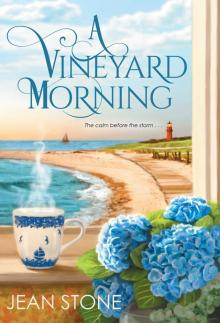 A Vineyard Morning
A Vineyard Morning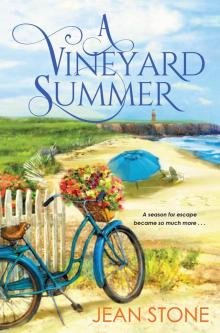 A Vineyard Summer
A Vineyard Summer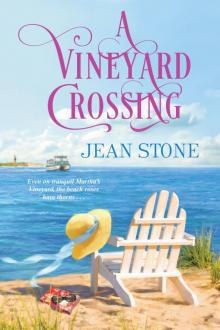 A Vineyard Crossing
A Vineyard Crossing A Vineyard Christmas
A Vineyard Christmas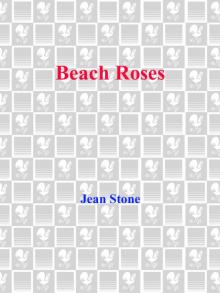 Beach Roses
Beach Roses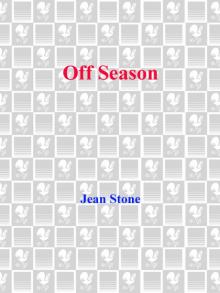 Off Season
Off Season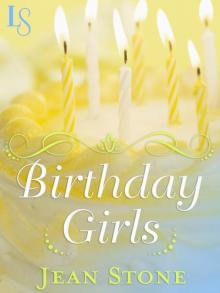 Birthday Girls
Birthday Girls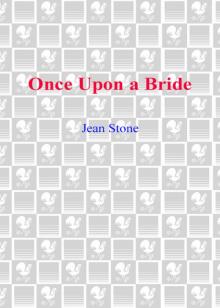 Once Upon a Bride
Once Upon a Bride Places by the Sea
Places by the Sea Trust Fund Babies
Trust Fund Babies The Summer House
The Summer House Tides of the Heart
Tides of the Heart Sins of Innocence
Sins of Innocence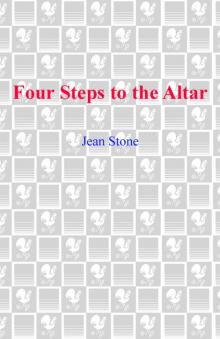 Four Steps to the Altar
Four Steps to the Altar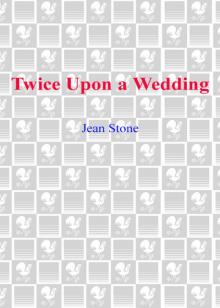 Twice Upon a Wedding
Twice Upon a Wedding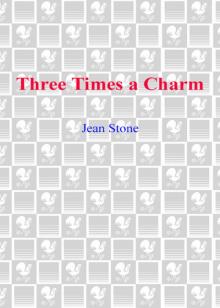 Three Times a Charm
Three Times a Charm